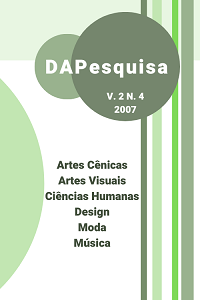Uma leitura dos “exercícios espirituais”
DOI:
https://doi.org/10.5965/1808312902042007040Keywords:
Jesuítas, exercícios espirituais, teatralidade, disciplinaAbstract
Esse artigo emprega o conceito de teatralidade para efetivar uma leitura dos Exercícios Espirituais, obra de Ignácio de Loyola destinada à evangelização e articulada como um treinamento corporal. Emprega ainda, a partir de sugestões de Michel Foucault sobre disciplina, reflexões sobre as relações sociais que marcam tais práticas.
Downloads
References
ALBUQUERQUE, José Augusto Guilhon; FOUCAULT, Michel. Michel Foucault e a teoria do poder. Tempo Social: revista de sociologia da USP. São Paulo: FFLCH/USP v. 7, n. 1/2, p.105-110, out. 1995.
BARTHES, Roland. Sade, Fourier, Loyola. Lisboa. Edições 70: s/d.
FERAL, Josette. Acerca de la teatralidad. Buenos Aires. Nueva Generación/UBA: 2003.
FOUCAULT, Michel. Vigiar e punir: nascimento da prisão. 27ª. Ed. Petrópolis: Vozes, 2003.
GOFFMAN, Erving. A representação do eu na vida cotidiana. 13º ed. Petrópolis: Vozes, 2005.
GAMBINI, Roberto. O espelho índio: os jesuítas e a destruição da alma indígena. Rio de Janeiro: Espaço e Tempo, 1988.
LOYOLA, Inácio de. Exercícios Espirituais. Porto Alegre, 1966.
CARDOSO, Armando. Autobiografia de Inácio de Loyola. 5. ed. São Paulo: Loyola, 1997.
KARNAL, Leandro. Teatro da fé: representação religiosa no Brasil e no México do século XVI. São Paulo: Hucitec, 1998.
LEITE, Serafim. Historia da companhia de Jesus no Brasil. Rio de Janeiro: INL, 1943.
Downloads
Published
How to Cite
Issue
Section
License
Copyright (c) 2019 Edélcio Mostaço, Camila Aschermann Mendes de Almeida

This work is licensed under a Creative Commons Attribution 4.0 International License.
Authors who publish in this journal agree to the following terms:
The authors retain the copyright and grant the journal the right of first publication, with the study being simultaneously licensed under the Creative Commons Attribution-Noncommercial License, which allows the sharing of work with acknowledgment of authorship and initial publication in this journal.
This journal, following the recommendations of the Open Access movement, provides public access to all its content, following the principle that free access to research leads to a greater global exchange of knowledge.
Plagiarism in all its forms constitutes unethical publication behavior and is unacceptable. The Journal DAPesquisa reserves the right to use software or other methods of detecting plagiarism to analyze submitted works.





